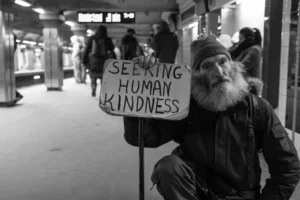“As a 28-year-old single woman, I want to be independent. But it’s often a burden. For example, I recently needed something fixed in my apartment but couldn’t get myself to ask a male friend at church out of the fear of looking needy.”
I read this woman’s concerns and took some time to think through her words. But something about her simple email didn’t sit well with me. Maybe it was her description of the word “independence” as someone who didn’t ask for help. Or maybe it was the alternative she offered in which the opposite of independence was considered “needy.”
Either way, it was clear that her definition of independence was one that was causing burdens, not blessings. And the truth is she’s not alone in her struggle. As a professional counselor specializing in relationships, I work with people every day who are struggling somewhere along the spectrum of “dependence to independence.”
We live in a country that esteems independence and the do-it-yourself mentality. We raise our children to grow up fast and encourage them to be on their own by age 18. But I have to wonder if our view of independence is healthy or even biblical.
While I agree with the concepts of working hard, doing your best, setting boundaries, and taking care of yourself to the best of your ability, I sometimes wonder if the concept of “independence” is a little overrated in our cultural context. All over Scripture I see the value of community, of connection and of fellowship among believers. They encouraged, supported and relied on each other. Maybe our Westernized concept of independence is totally overrated.
One thing I’ve observed in working with people is that when it comes to relationships, there are three characteristics that tend to make their way into our interactions with others:
1. Complete Independence
The important thing to realize about this characteristic is that it’s deceiving. It gives the appearance of control, but is typically found in people who feel or have felt a lack of control in some area of their life. Maybe the lack of control stems from the wounds of their past or a difficult situation in the present in which they feel powerless. Those who fall under the category of complete independence have a deep-seated belief that they don’t “need” people. But oftentimes, that lack of need stems from an inability to trust others to do things for them. What if they don’t come through? What if they let me down? What if they don’t do it the way I want it done? What if I end up getting hurt? But when this mentality carries over into relationships, it can be harmful.
Couples who are completely independent continue to function as individuals, even within the context of a relationship. They make decisions, plans and preparations for only themselves and expect their partner to do the same. In an attempt to protect themselves, completely independent people may have a tendency to become emotionally unavailable, isolating and excluding those with whom they are in a relationship. Because independence offers the illusion of strength, it is often a response that comes from fear of trusting others, insecurities from within, and personal weaknesses. Healing can only begin when one can identify the root of their trust issues and learn to open up to others in a slow, safe and healthy way.
2. Co-dependence
In my book, True Love Dates: Your Indispensable Guide to Finding the Love of Your Life, I spend chapter 7 talking about the concept of co-dependence in a relationship. This characteristic is the opposite of the completely independent person in that they feel as though they are constantly in need of people. They look to others for approval, for affirmation, for validation and for worth. They are drawn into relationships because of what they “need” rather than what they have to give.
You might recognize co-dependent people because they are often moving from one romantic relationship into another with hardly any recovery time. Being alone is almost impossible, because they need people to feel affirmed and valuable.
The problem with co-dependence is that it’s about entering a relationship “half full” and looking for someone else to fill them up. Co-dependent people usually come from backgrounds of pain, hurt, neglect, abandonment or abuse, and somewhere along the way, they believed the lie that they need to prove they are worth loving. These people are often referred to as “needy,” but the truth is we’re all “needy” in some way. We’re “in need” of a Savior — a Savior who can bind up our wounds, speak value and worth into our lives, and fill us to overflowing with His love.
3. Interdependence
The third characteristic is the one we’re all after, because it’s balanced, healthy and strong. According to God’s Word, interdependence is the ideal way to look at relationships. It’s the perspective that relationships are a part of life, and though we don’t need each other for value and worth, we choose one another because relationships are what make life worth living. They are the way we show God’s love. God, who chose to be in relationship with us, made us for relationships. He chose to save us, to serve us, and to connect with us out of sheer love.
Scripture tells us to encourage one another, edify one another, help one another, and be there for one another. It calls us into the give-and-take relationships found in the community of the body of believers.
Like the 28-year-old woman in the story above, when we need something fixed, we should be able to ask for it, knowing that we will have the opportunity to bless and serve others when we’re called upon as well. This is the kind of mentality that needs to spill over into our romantic relationships, a mentality that doesn’t “need” another, yet “chooses” another out of unconditional love, respect, commitment, and honor.
Call me a romantic, but isn’t there something beautiful about being loved by someone not because we are needed, but rather, because we have been “chosen”? I’m thankful for the interdependent relationships God has called us to have among the body of believers. May we learn to recognize and nourish this characteristic in our life, and may it begin to overflow into all of our relationships, love-life included.
Next Steps: Where do you fall on the spectrum of these three characteristics? How has that shaped your past or current relationships? How has that impacted your relationships with the opposite sex? What parts of your relational world is God calling you to change, heal or grow?
If you feel stuck in one of the above relationship patterns, consider moving toward healthy relationships with the help of a professional counselor. Check out Focus on the Family’s list of recommended Christian counselors near you.
Copyright 2015 Debra Fileta. All rights reserved.











